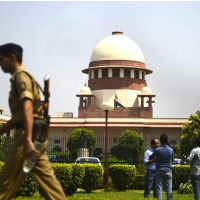Reform 04: Obsolete Laws to be Junked
 The Supreme Court (file photo: AFP/Getty Images)
The Supreme Court (file photo: AFP/Getty Images)
‘Her Majesty’ and ‘East India Company’ are still mentioned in some obsolete laws in India’s statute books, 67 years after independence from British colonial rule. The NDA government has come up with a simple solution: a clean-up of obscure laws that no longer serve any purpose. The Law Ministry is leading the drive, by digging out 287 outdated laws that will be repealed in the next session of parliament in November.
"Some of the laws on our books are laughable. Others have no place in a modern and democratic India," Law Minister Ravi Shankar Prasad told Reuters.
Here are a few “laughable” laws still current in India:
- An 1838 law says property in an area of Calcutta can only be sold to the East India Company.
- If you happen to discover buried treasure worth even as little as 10 rupees (16 U.S. cents), it still belongs to "Her Majesty", according to the Treasure Trove Act of 1878.
- An 1855 statute removed a tribe from the purview of local laws because it was an "uncivilised race".
- Flying kites or balloons without police permission is illegal as these are classified as "aircraft" under a 1934 act.
- A World War II decree outlaws the dropping of pamphlets from the air in Gujarat.
- Under the Motor Vehicles Act in Andhra Pradesh, a motor inspector must have a clean set of teeth and anyone with a "pigeon chest, knock knees, flat foot, hammer toes and fractured limbs" would be disqualified.
The repeal of outdated laws is part of Prime Minister Narendra Modi’s drive for effective governance and to reduce the role of the state.
Soon after winning the general election in May, Modi had told a meeting of senior bureaucrats that "there may be rules and processes which have become outdated, and instead of serving the process of governance, they are leading to avoidable confusion". He had called upon all ministries to "identify and do away with such archaic rules and procedures".
In August, the prime minister appointed a committee to identify and review laws that had been introduced as recently as 15 years ago and “may have become obsolete.”
Modi believes that less regulation and faster decision-making will catapult India from its current ranking of 134 out of 189 countries on the World Bank's ease of doing business table into the top 50.
Previous administrations had failed to remove obscure laws dating back to the 19th century, either because of objections by government departments or simply a lack of will.
"There are instances where the entire statute is dysfunctional," said prominent economist Bibek Debroy, who has written a book on the absurdities of Indian law.
For instance, a swanky New Delhi hotel was threatened with a lawsuit for refusing to give water to a person who invoked an 1867 act under which a rest house must offer passers-by free drinks of water.
Meanwhile, factory rules require spittoons to be kept in the premises as well as earthen pots for drinking water.
Yet even after the largest-ever cull of laws in India, there will still be hundreds of clauses within other laws and thousands of regulations that are real obstacles to business. The government has started identifying these anomalies too, according to the law minister.
- Karan Singh
To Learn More:
India wields the axe on Her Majesty's "laughable" laws (by Sanjeev Miglani, Reuters)
Report calls for scrapping of 100 outdated laws (by Himanshi Dhawan, The Times of India)
Five Outdated Laws Modi Could Scrap (by Aditi Malhotra, The Wall Street Journal)
In keeping with Modi’s poll promise, govt to repeal 36 archaic laws (The Times of India)
- Top Stories
- Controversies
- Where is the Money Going?
- India and the World
- Appointments and Resignations
- Unusual News
- Latest News
- India College Chain’s Expansion into U.S. Draws Opposition from Massachusetts Officials over Quality of Education
- Milk Shortages in India Tied to Release of New Movies Featuring Nation’s Favorite Stars
- Confusion Swirls around Kashmir Newspaper Ban in Wake of Violent Street Protests
- Polio-Free for 5 Years, India Launches Vaccine Drive after Polio Strain Discovery
- New Aviation Policy Could Increase Service, Lower Ticket Prices






Comments